Is Benadryl Addictive?

Benadryl (diphenhydramine) is a first-generation antihistamine that is used primarily for the treatment of allergy symptoms like hives, itching, and sneezing. While Benadryl is not classified as a sedative drug, it does have a sedative effect. For that reason, people sometimes use it as a sleep aid.
When used for off-label purposes, or when taken in dosages above what is directed, Benadryl can become addictive. If you’re concerned that you or someone you know is addicted to Benadryl, treatment can help.
In this article, you’ll learn why Benadryl is addictive, and how to seek treatment if you have concerns about your use of the medication.
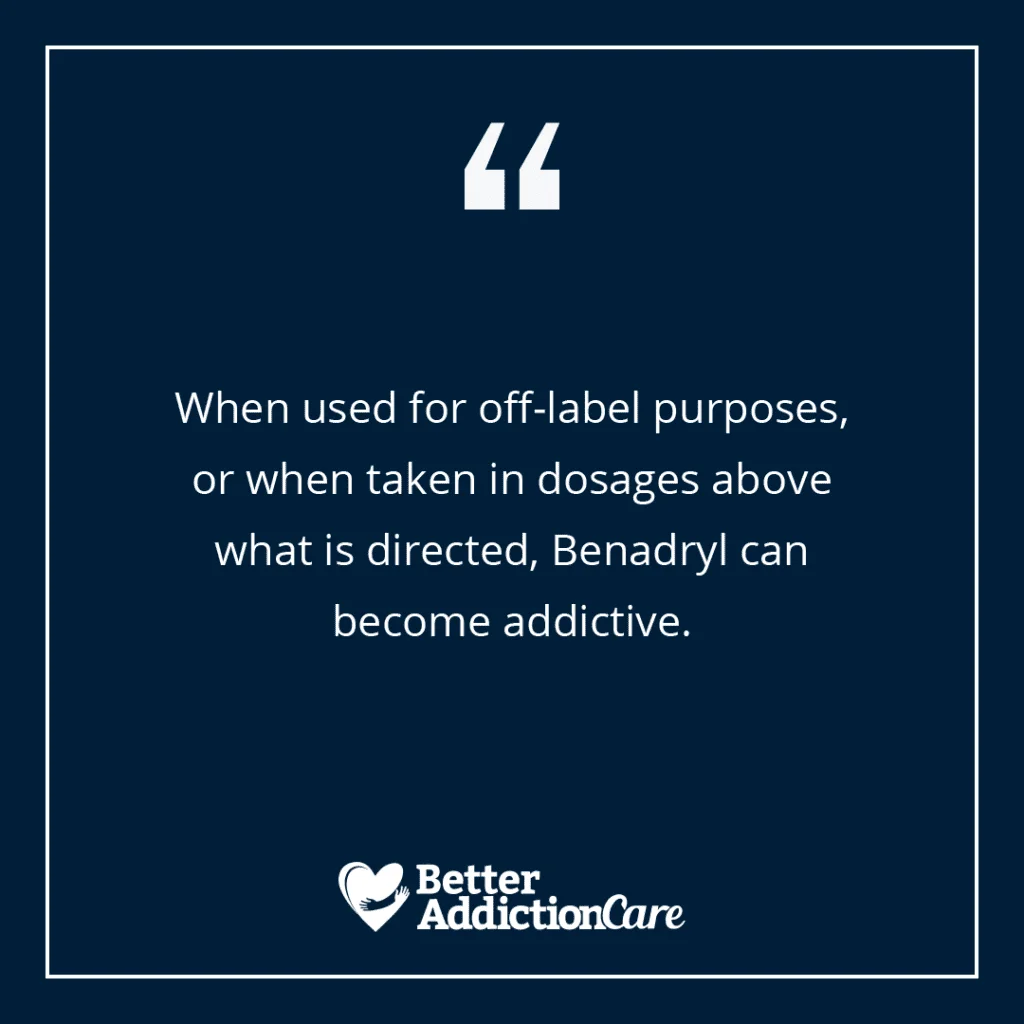
Why is Benadryl Addictive?
Over-the-counter medications like Benadryl are often misused because they are easily accessible and affordable. Those who use it regularly to treat insomnia or anxiety can sometimes develop a physiological dependence or an addiction.
The addictive nature of Benadryl relates to its interaction with several brain neurotransmitters, including acetylcholine, serotonin, norepinephrine, dopamine, opioids, and adenosine.1
Benadryl works by inhibiting the histamine-1 receptor (H1), which blocks the usual action of histamines that cause allergy symptoms.2 In addition to being an antihistamine, Benadryl is also an anticholinergic drug, which means that it blocks the neurotransmitter acetylcholine.
As an antihistamine, Benadryl crosses the blood-brain barrier and triggers the reward activation center in the brain. This produces a similar effect to that of stimulant drugs like cocaine, though less extreme.3
Antihistamines like Benadryl also increase dopamine, a hormone and neurotransmitter that is sometimes described as a “feel good” chemical because it produces euphoria.5 This may be why some people are more prone to Benadryl misuse and addiction than others.
Benadryl is addictive if you misuse it by:
- Use it more frequently than directed
- Use higher doses than directed
- Crush it and snort it
- Inject it
- Mix it with other substances, like alcohol or opioids
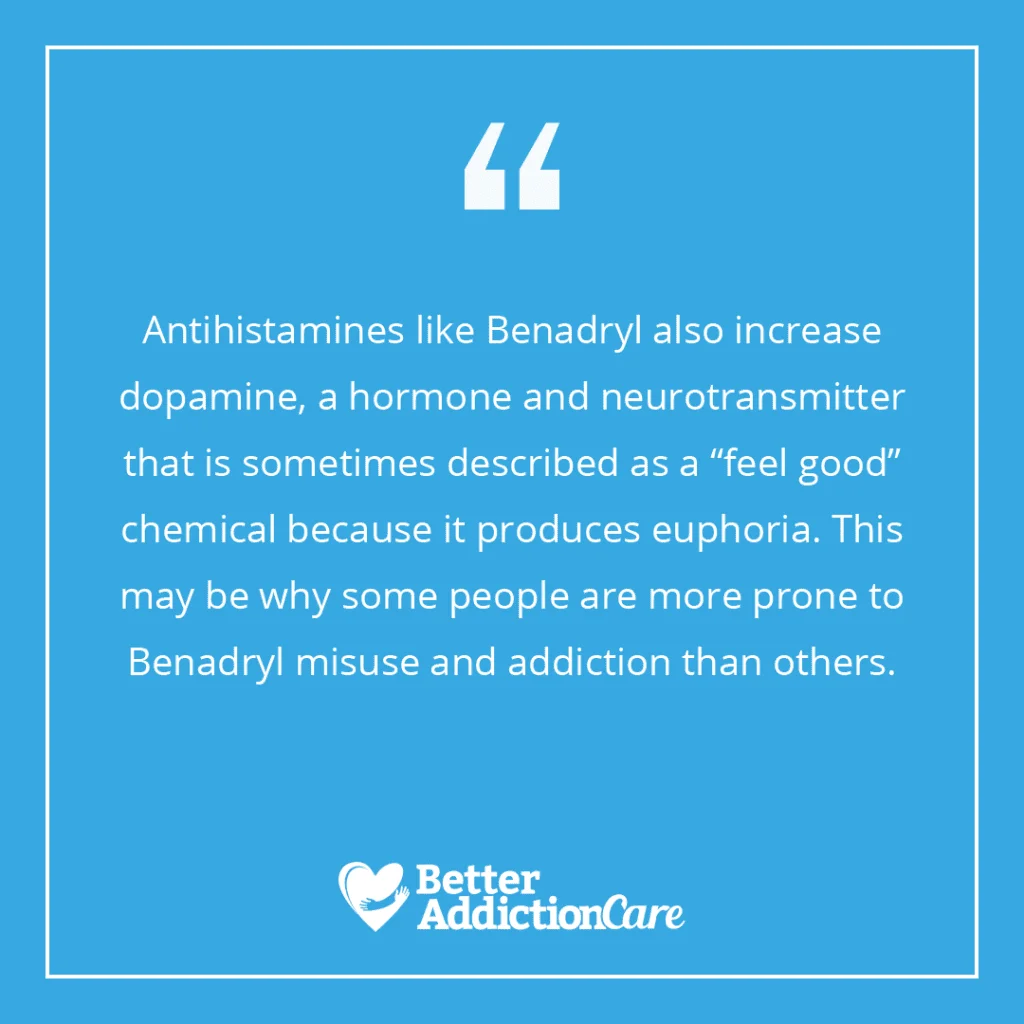
How Benadryl Use Can Progress to Addiction
Here’s an example of how addiction to Benadryl can happen: You’ve heard that Benadryl helps with sleep, so you take a dose before bed to see what happens. You get a good night’s sleep, so you decide to take it again the next night. Soon, you’re taking Benadryl every night. As time goes on, the same amount of Benadryl may not help you fall asleep anymore, so you take an extra dose—this is called tolerance and can contribute to dependence and Benadryl addiction.4
Over time, your body adjusts to the higher doses of Benadryl as you begin to develop a dependence. At this point, you may notice that if you miss a dose, you experience Benadryl withdrawal symptoms. Because of the uncomfortable withdrawal symptoms, you may resume pill use to mitigate these symptoms and feel better. This cycle contributes to the progression from tolerance and dependence to Benadryl addiction—a pattern of drug-seeking and drug-using behaviors despite negative consequences.
At this stage, you may need detox services and Benadryl addiction treatment to help you abstain from use.
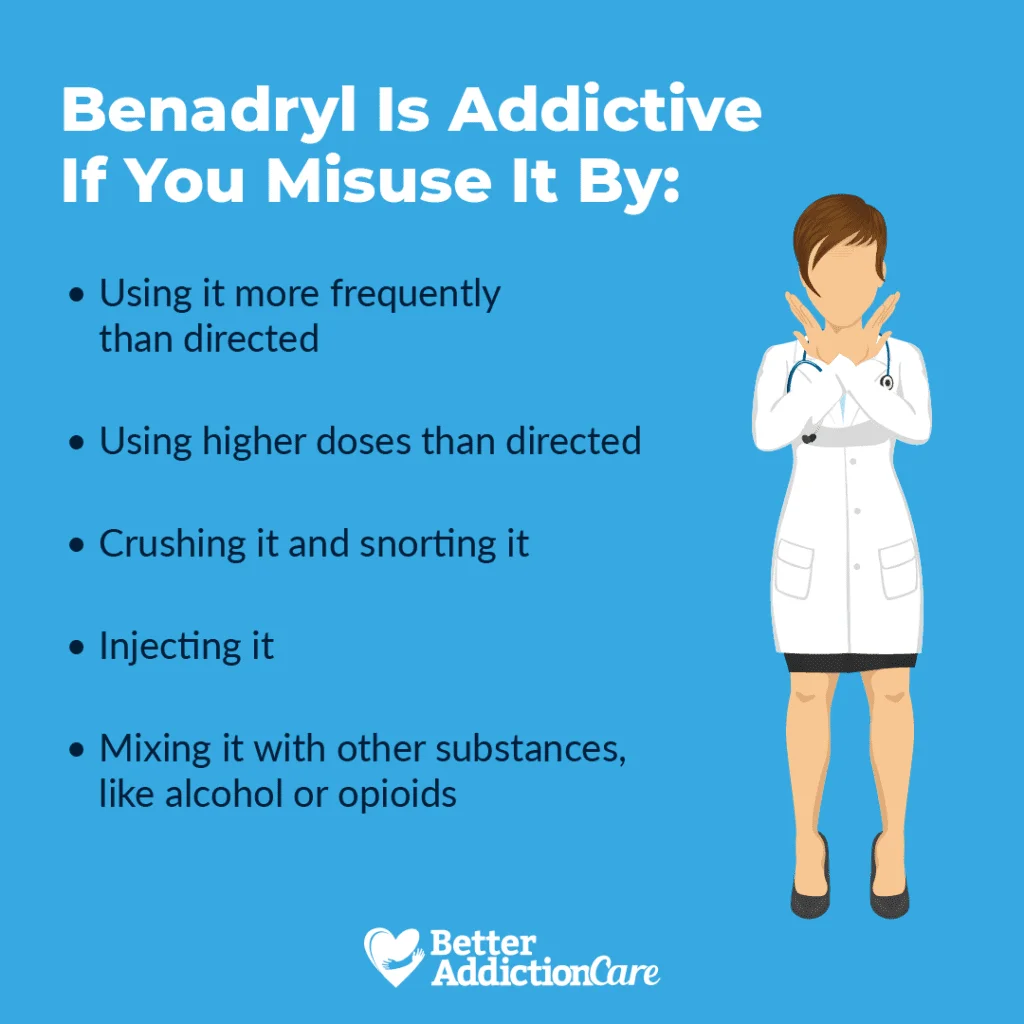
Risk Factors for Benadryl Addiction
Risk factors that can lead to a Benadryl addiction include the following:4
- Temperamental Factors: People who are impulsive in nature and those who routinely seek out novel and exciting experiences may have a genetic predisposition for developing an addiction. Lower levels of self-control have been associated with misusing substances like Benadryl.
- Environmental: Social influences and norms may increase exposure to substances, which also increases the risk of developing an addiction.
- Genetic & Biological: Genetic and biological factors can increase the risks for developing an addiction. For example, women have a higher risk for substance misuse.
Here are some risk factors that are specific to Benadryl misuse and Benadryl addiction:
- Struggling with sleep problems
- Struggling with an undiagnosed anxiety disorder
Risk factors increase the likelihood that you may develop a Benadryl addiction, but they do not decide your fate—it’s possible to have one or more risk factors without becoming addicted to Benadryl or any other substances.
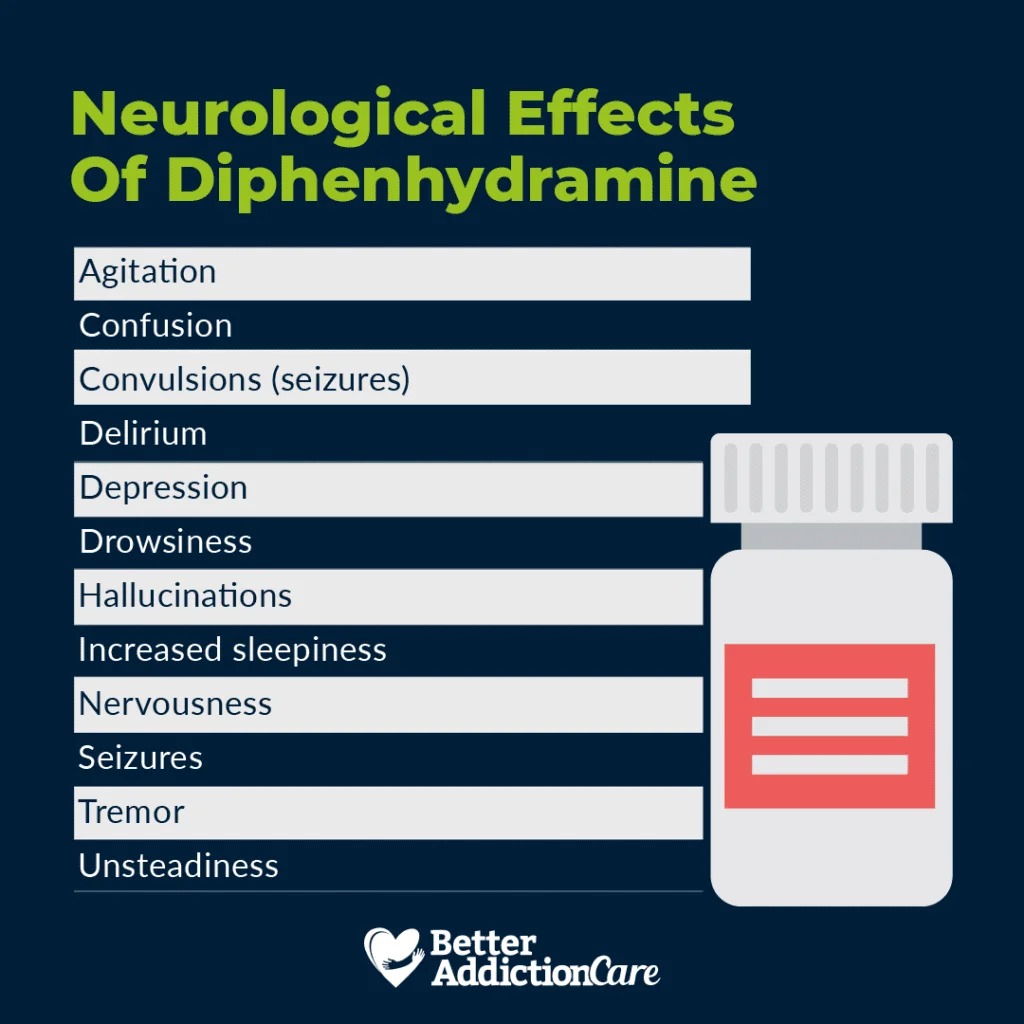
Signs and Symptoms of Addiction
A Benadryl addiction is a chronic and relapsing condition that can lead to many harmful consequences in several areas of your life, such as work, home, and school. It may negatively affect your finances, relationships, physical health, and mental health.
The following signs and symptoms may indicate a Benadryl addiction:4
- You’ve increasingly taken larger amounts of Benadryl than you intended over a long period of time.
- You want to cut down on your use of Benadryl, but you haven’t been able to.
- You spend a lot of time obtaining, using, or recovering from the effects of Benadryl.
- You crave or have a strong desire to use Benadryl.
- Your recurrent use of Benadryl has interfered with your ability to follow through on obligations at work, school, or home.
- You’ve continued to use Benadryl despite its negative effects on your relationships.
- You’ve neglected social, occupational, or recreational activities that you once enjoyed due to your use of Benadryl.
- You continue to use Benadryl, even when it puts you in physically hazardous situations.
- You continue to use Benadryl despite knowing that it is causing physical or psychological problems for you.
- You’ve developed a tolerance to Benadryl, as defined by one of the following:
- A need for more Benadryl to achieve the same desired effect
- A reduced effect from using the same amount of Benadryl
- You’ve experienced symptoms of withdrawal, as defined by one of the following:
- You’ve experienced characteristic withdrawal symptoms of Benadryl (e.g., rapid heart rate, confusion, increased salivation, sweating, clammy skin, tremors, or seizures.5
- You use Benadryl (or another closely related substance) to reduce or eliminate withdrawal symptoms.
The following scale is sometimes used to categorize the severity of Benadryl addiction:
- Mild: Presence of 2–3 symptoms
- Moderate: Presence of 4–5 symptoms
- Severe: Presence of 6 or more symptoms
In general, the more behaviors that meet these criteria, the more severe your Benadryl addiction may be.
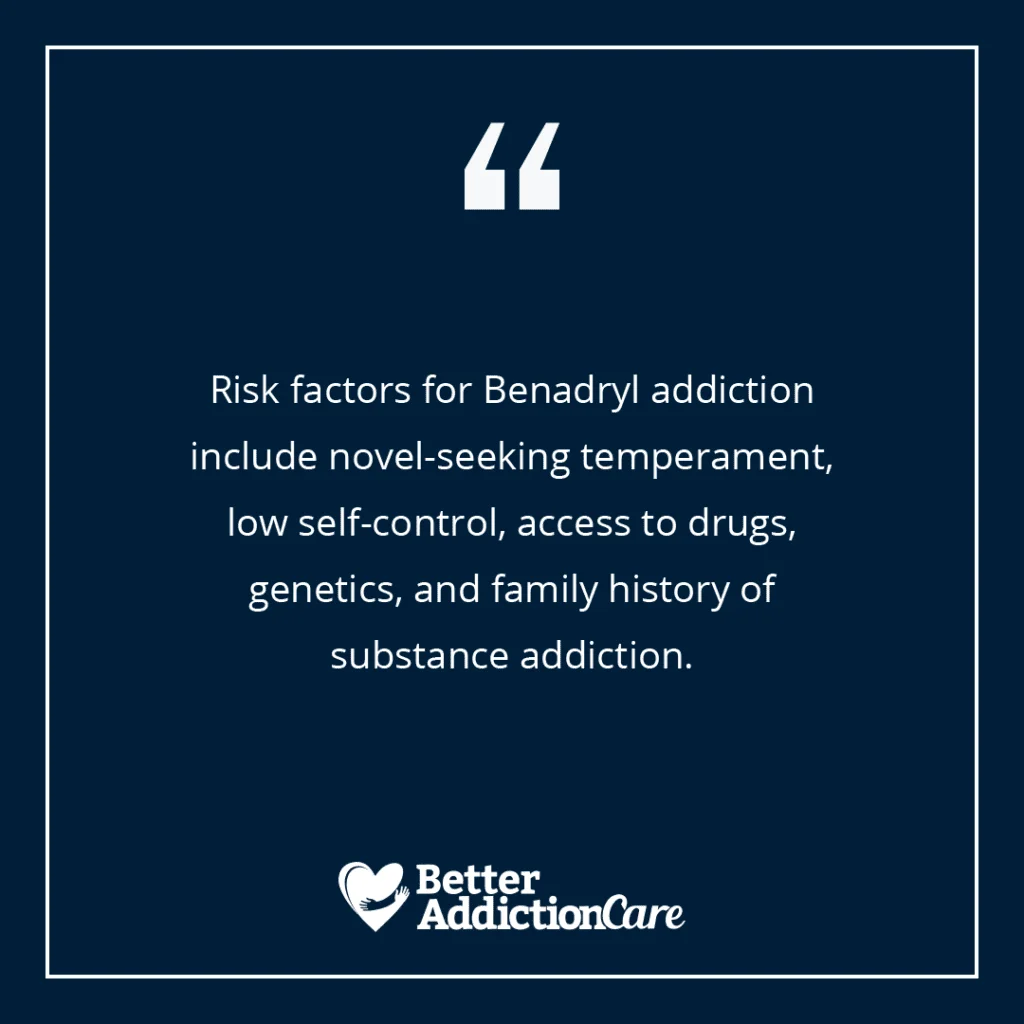
What is the Difference Between Dependence and Addiction?
Here are some of the differences between Benadryl dependence and Benadryl addiction.6
- Benadryl dependence: In a state of physiological dependence, your body becomes adapted to a medication like Benadryl, and can only function normally when the substance is present. One way to tell if you’ve developed a dependence on Benadryl is that you experience symptoms of withdrawal when you stop taking it, even if you’ve been taking it as prescribed by your doctor.
- Benadryl addiction: In the case of Benadryl addiction, there is a marked pattern of drug-seeking behavior that leads to ongoing use. Most people who are addicted to a substance have also developed a dependence, but it is possible to be dependent on Benadryl without being addicted to it. As such, addiction refers to repetitive, compulsive, and habitual Benadryl use.
The key thing to know is that both Benadryl dependence and addiction are treatable.
Find the Best Rehab for Benadryl Addiction
Without treatment, the misuse of over-the-counter medications can lead to the misuse of more damaging substances. Getting help early can help reduce additional health risks that come with Benadryl misuse.
Rehab programs help people heal from addictions to substances like Benadryl. Using a wide variety of treatment approaches, they are specifically designed to help reduce or eliminate the need for a drug.
Before you can find the best rehab for Benadryl addiction, it’s important to understand the different types of programs that are available.
The American Society of Addiction Medicine (ASAM) has identified five broad levels of care related to addiction treatment. This care continuum of care takes a stepped approach to treatment, meaning that you can step up or down in services, depending on your needs.7
- Early Intervention: Includes preventive care and education for those who are at risk for Benadryl misuse
- Outpatient: Includes fewer than 9 hours of behavioral therapy and counseling per week
- Intensive Outpatient/Partial Hospitalization: Includes more than 9 hours of outpatient services per week, and may include partial hospitalization for people who may benefit from more intensive treatment
- Residential/Inpatient: Includes varying levels of clinical and medical monitoring, as well as residential services for people who require intensive treatment
- Medically Managed Intensive Inpatient: Includes 24/7, round-the-clock care, behavioral therapy and treatment for people with severe Benadryl addictions or who have medically unstable conditions
The biggest difference between inpatient and outpatient treatment programs is the level of care provided. A treatment support specialist can help guide you through the options and help you understand which treatment option is right for you.
Call our 24/7 helpline at 1-800-429-7690 to speak with one of our treatment support specialists who can help you find the resources you need for your Benadryl addiction.
Frequently Asked Questions About Benadryl
Is Benadryl Banned?
While the FDA has issued a warning about Benadryl, it is not a banned medication in the U.S.8 The medication may be banned in other countries, however.
Can You Take Benadryl for Sleep?
While some people use Benadryl off-label as a sleep aid, there is little evidence to support its efficacy or safety for that use.9 Always consult your doctor before taking medications for conditions other than as prescribed.
Is Benadryl Fatal?
Taking higher than recommended doses of Benadryl, or any over-the-counter or prescribed medication, can cause serious health problems, including overdose and death.
Who Should Not Take Benadryl?
Contraindications associated with using Benadryl include the following: children under 6, angle-closure glaucoma, and prostatic hypertrophy with obstructive uropathy.2 Talk with your doctor before taking Benadryl.
What are the Side Effects of Benadryl?
Some side effects that have been associated with Benadryl include:2
- Drowsiness
- Dizziness
- Confusion
- Restlessness
- Nausea, vomiting, diarrhea
- Chest tightening/wheezing
- Blurred vision/double vision
- Constipation
- Heart palpitations
- Rash
- Sensitivity to light
- Anemia
- Low blood pressure
Resources
Treatment Centers in Virginia





